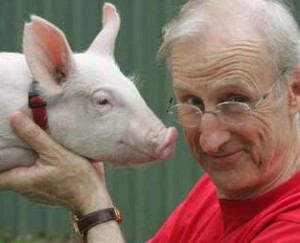Ag Plays – The Beans or the Business?
Courtesy of Joshua M Brown, The Reformed Broker
Farmer Brown here again. One of my key longer-term themes for growth investing is and has been the Agriculture Play for a few years now. The global demographics, while seemingly moving at a glacial pace to the short-term thinkers, are simply undeniable over the intermediate to longer term.
A recent landmark piece of research from Goldman Sachs suggests that stock market capitalization in emerging countries may grow fivefold over the next 20 years to more than $80 trillion. Keep in mind that this is the same research department that nailed owning the BRIC country stocks as the Market Call of the Last Decade.
More prosperity reaching the developing world (a majority of the earth’s population) means a historic shift in the world’s diet from simple grains to meats. The first thing a Third World peasant farmer-turned-industrialist goes upscale on is his food. And once you go chicken and beef, it’s mighty hard to go back to sprouts. Unless you think that globalization and gentrification will reverse, this shift probably represents the most monumental investing opportunity of our lifetime.
The theme is becoming a well-known one, but now we’ve reached the juncture where we must ask the age old question of "What’s the trade?". If there was one takeaway from the book The Greatest Trade Ever, it’s that lots of folks saw the housing and mortgage crash coming, but only a few figured out how to express that awareness into a profitable trade.
The Ag Story is every bit as fat a pitch coming down Broadway for investors as the real estate crash was. The flash food riots that rippled around the globe briefly in early 2008 were likely a mere preamble to something much bigger, but how do we set ourselves up for it? The considerations here are getting the timing right, owning the correct vehicles, staying perspicacious in the event that the winners start breaking away from the pack early and, finally, having enough bases covered that you don’t nail the theme but miss the upside (also known as mis-expressing the trade).
Gradually, there are three schools of thought emerging on how to play the Ag Trade. I will give you a brief idea of what they are and then encourage you to do your own research, as always. I don’t do advice or tips on this site, that’s my day job.
Anyway, here are the three most common faces of the Ag Trade:
1. The Landowner
This is a "trade" that has been put on almost accidentally by many commercial farmers and small rural business owners. They have unsuspectingly woken up in many cases to have found that their farmland has actually been the best-performing asset class in the country for the past decade.
Anecdotally speaking, several clients of mine in the grain and soybean belts have been consolidating the tracts of others for years now in the absence of any readily discernible opportunities in "stupid stocks". Over the last year or so, the hedge funds have begun to plow in (pun intended) as well; Connecticut and Manhattan finance types are making land deals in the Heartland like never before.
2. Seeds and Beans and Husks and Bushels
A second common way that investors are seeking to cash in on the coming Agriculture investment cycle is through commodities and futures themselves. The vehicle you will most commonly hear about in this context is the PowerShares Deutsche Bank Agriculture ($DBA).
Launched 3 and a half years ago during the 2007 Bull Market in Everything, DBA is essentially a basket of agricultural commodities, like wheat, corn, cocoa, sugar, soybeans and even lean hogs. These are held in the form of futures contracts which are continuously rolled over. The ETF basically allows stock investors to potentially benefit from any rise in the prices of these farm products without having to actually buy land, bring in a harvest and go to market (or learn to trade futures).
3. Agribusiness Tycoon
The third (and most common) play we’re seeing investors put on to get involved with the Ag Trade would be through the businesses themselves, publicly-traded farm outfits in the stock market. This can be accomplished by owning the names directly or through yet another ETF, this one holding the companies’ stocks as opposed to futures contracts on commodities.
The most popular fund of this type is called the MarketVectors AgriBusiness ETF and it comes complete with a cutesy ticker symbol ($MOO). MOO holds shares in companies like seed science firm Monsanto ($MON), grain producer Archer Daniels Midland ($ADM), tractor giant Deere ($DE) and fertilizer maker Mosaic ($MOS). Theoretically, should a major expansion of higher-grade food demand sweep the globe, investors would bet that the goods and services that these agribusinesses offer would become a lot more valuable, along with their stocks.
***
For most investors, buying tracts of arable land in the US or in places like Africa (where China has begun to buy up farms) is not very realistic. This is why many will chose one of the other two options to express the trade – the Beans or the Businesses. Use this post as your inspiration to research other vehicles and plays on this theme if you agree with me that it could be one of the young decade’s most important.



